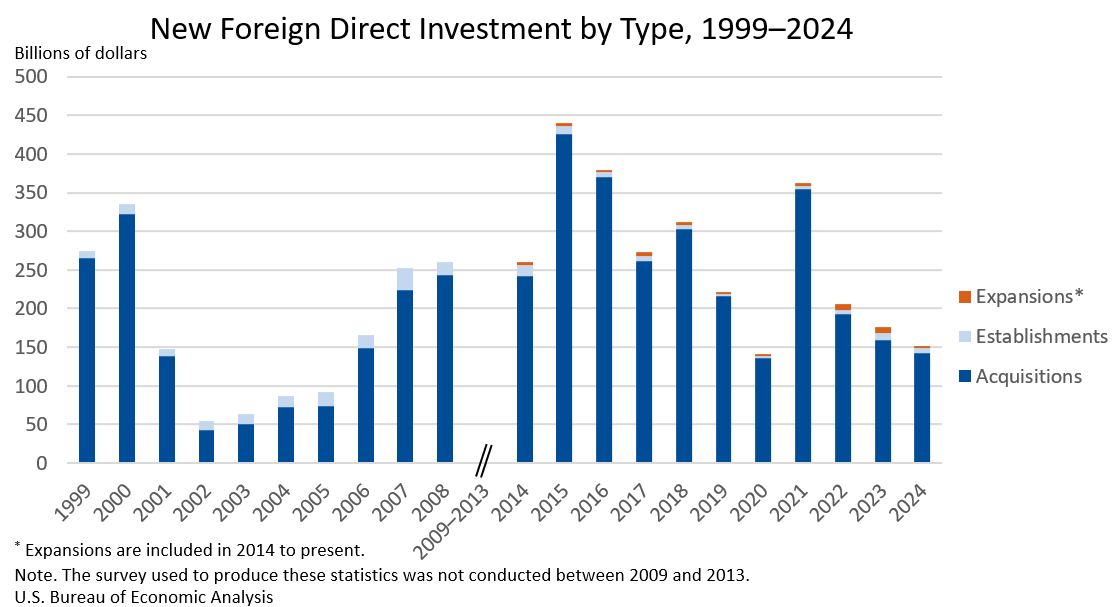Bureau of Economic Analysis
New Foreign Direct Investment in the United States, 2024
Expenditures by foreign direct investors to acquire, establish, or expand U.S. businesses totaled $151.0 billion in 2024, according to preliminary statistics released today by the U.S. Bureau of Economic Analysis. Expenditures decreased $24.9 billion, or 14.2 percent, from $176.0 billion (revised) in 2023 and were below the annual average of $277.2 billion for 2014–2023. As in previous years, acquisitions of existing U.S. businesses accounted for most of the expenditures.
Principal Federal Economic Indicators
Noteworthy
- 2025 News Release Schedule
- Innovation at BEA
- 2025 Annual Updates
- New! Services Trade Data for More Countries
- Data Tool: Trade in Value Added
- Distribution of State Personal Income
- Updated: RIMS II Regional Multipliers
- Arts and Culture
- Space Economy
- FDI Now in State BEARFACTS
- Quick Guide: Price Indexes
The Latest
First Estimates of GDP Will Include More Census Bureau Data
The Bureau of Economic Analysis is constantly working with our data partners to make GDP — our signature measure of the ever-changing U.S. economy — even better. As part of that effort, our sister statistical agency, the U.S. Census Bureau, has committed to providing key data for GDP even faster.
Getting this crucial data faster will make the information used to calculate initial estimates of quarterly gross domestic product more…
March 2016 Trade Gap is $40.4 Billion
The U.S. monthly international trade deficit decreased in March 2016 according to the U.S. Bureau of Economic Analysis and the U.S. Census Bureau. The deficit decreased from $47.0 billion in February (revised) to $40.4 billion in March, as imports decreased more than exports. The previously published February deficit was $47.1 billion. The goods deficit decreased $6.0 billion from February to $58.5 billion in March. The services surplus…
U.S. International Trade in Goods and Services, March 2016
U.S. Census Bureau U.S. Bureau of Economic Analysis NEWS U.S. Department of Commerce * Washington, DC 20230 U.S. INTERNATIONAL TRADE IN GOODS AND SERVICES March 2016 The U.S. Census Bureau and the U.S.
Personal Income Rises in March
Personal income increased 0.4 percent in March after increasing 0.1 percent in February. Wages and salaries, the largest component of personal income, increased 0.4 percent in March after decreasing 0.1 percent in February.
Personal Income and Outlays, March 2016
Personal income increased $57.4 billion, or 0.4 percent, and disposable personal income (DPI) increased $50.4 billion, or 0.4 percent, in March, according to the Bureau of Economic Analysis. Personal consumption expenditures (PCE) increased $12.8 billion, or 0.1 percent.
GDP Increases in First Quarter
Real gross domestic product (GDP) increased 0.5 percent in the first quarter of 2016, according to the “advance” estimate released today by the Bureau of Economic Analysis. In the fourth quarter of 2015, real GDP increased 1.4 percent.
Gross Domestic Product, 1st quarter 2016 (advance estimate)
Real gross domestic product -- the value of the goods and services produced by the nation's economy less the value of the goods and services used up in production, adjusted for price changes -- increased at an annual rate of 0.5 percent in the first quarter of 2016, according to the "advance" estimate released by the Bureau of Economic Analysis.
Industry in Focus: What's the Economic Impact of the Information Industry?
The Information industry, more than just about any other industry, illustrates just how much the U.S. economy has changed over time. Not all that long ago, in previously used industry classification systems, the information sector didn’t have its own category. Many of its activities fell under other industries such as manufacturing, communications, and business services, but weren’t always separately identified.
Information Services Led Growth in the Fourth Quarter
Information; construction; and professional, scientific, and technical services were the leading contributors to the increase in U.S. economic growth in the fourth quarter of 2015. Overall, 16 of 22 industry groups contributed to the 1.4 percent increase in real GDP in the fourth quarter.
Gross Domestic Product by Industry, 4th quarter and annual 2015
Information; construction; and professional, scientific, and technical services were the leading contributors to the increase in U.S. economic growth in the fourth quarter of 2015. According to statistics on the breakout of gross domestic product (GDP) by industry released today by the Bureau of Economic Analysis (BEA), overall, 16 of 22 industry groups contributed to the 1.4 percent increase in real GDP in the fourth quarter.




